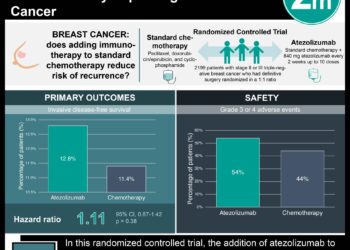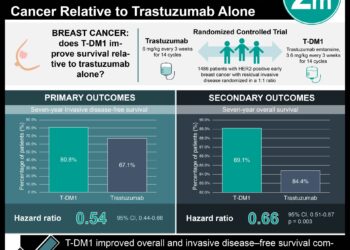Quick Take: Genomic characterization of metastatic breast cancers
Several late-stage cancers have been shown to acquire genomic alterations during disease evolution. In patients with breast cancer, 20% of metastatic tumors develop ESR1 mutations during endocrine therapy. However, the full spectrum of possible genomic alterations in metastatic breast cancer has not been described. In this study, the tumors of 617 patients with metastatic breast cancer (mBC) were sequenced using whole-exome sequencing to investigate the potential clinical relevance of all enriched somatic alterations. At baseline, 381 patients had hormone receptor positive (HR+)/HER2- breast cancer, 182 had triple-negative breast cancer, and 30 had HER2+ breast cancer. Researchers found that 21 genes were significantly mutated across the cohort or in at least one clinical subgroup (q<0.1). To determine which genes were differentially altered in mBC versus early breast cancer (eBC), the frequency of alterations observed in the study was compared to that in the Cancer Genome Atlas (TCGA). In patients with HR+/HER2- breast cancer, 9 driver genes were more frequently mutated in mBCs: TP53 (29%), ESR1 (22%), GATA3 (18%), KMT2C (12%) NCOR1 (8%), AKT1 (7%), NF1 (7%), RIC8A (4%) and RB1 (4%). Mutations in TP53, RB1, or NF1 were associated with a poor outcome in HR+/HER2- mRBCs (HR 2.20, 95% CI 1.57 to 3.07, p<0.001; HR 2.37, 95% CI 1.15 to 4.81, p=0.019; HR 1.91, 95% CI 1.09 to 3.35, p=0.024, respectively). Moreover, copy number analysis revealed that 18 amplicons were more frequently observed in HR+/HER2- mBCs than in eBCs. An analysis of mutational signatures demonstrated that HR+/HER2- mBCs exhibited an increase in 5 mutational signatures as compared to HR+/HER2- eBCs (p<0.001), and a decrease in 1 mutational signature. In multivariate analysis, 3 of the mutational signatures that were increased in mBCs, S10 (HR 1.67, 95% CI 1.20 to 2.32, p=0.002), S13 (HR 1.80, 95% CI 1.28 to 2.53, p=0.001) and S17 (HR 1.52, 95% CI 1.09 to 2.14, p=0.015), were associated with a poor outcome. Finally, mBCs showed an increase in mutational burden and clonal diversity compared to eBCs. In summary, this study identified several somatic alterations associated with poor outcomes in metastatic breast cancer, suggesting that early identification of these variants could inform therapy selection and may improve prognostication in these patients.
Click to read the study in Nature
Image: PD
©2019 2 Minute Medicine, Inc. All rights reserved. No works may be reproduced without expressed written consent from 2 Minute Medicine, Inc. Inquire about licensing here. No article should be construed as medical advice and is not intended as such by the authors or by 2 Minute Medicine, Inc.






